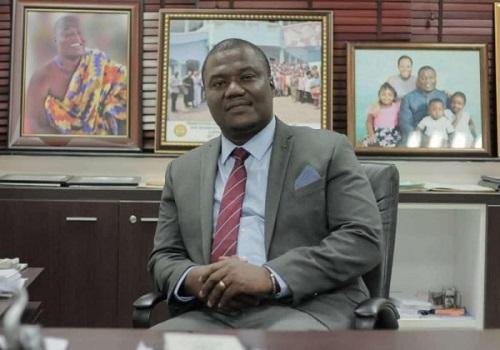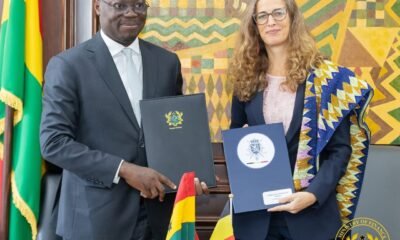News
Minority demands immediate action on delayed health worker salaries

The Minority in Parliament is calling on government to take urgent steps to pay the salaries of thousands of health workers who have not been paid for months.
Ranking Member on the Health Committee, Dr. Ayew Afriyie, expressed disappointment in the Ministry of Health for failing to resolve the issue, even though funds had already been allocated for the workers.
He explained that the financial clearance for recruiting the workers expired in December 2024 but could have been extended, as is normally done in the public service.
According to him, the government failed to act in time for political reasons, even though the workers were already at post and filling critical gaps in the health sector.
“Money was allocated for 15,000 workers. About 8,000 started work, and the rest were later engaged by the Ghana Health Service. Yet government did not extend the clearance. The institutions didn’t reject the workers either because they were needed. Now, ten months down the line, government is embarrassed because the workers are protesting,” Dr. Afriyie explained.
He criticised the Health Minister for seeking fresh cabinet approval, describing it as unnecessary since clearance had already been granted.
“You don’t need to go to cabinet when you already have clearance. This shows poor management and neglect of our frontline workers,” he said.
Dr. Afriyie added that the Minority had earlier shown patience and understanding by urging nurses to suspend their strike and return to work while government addressed their concerns.
However, he warned that their patience was running out, accusing the government of taking the youth for granted.
He stressed that the Minority would continue to speak up for health workers and ensure they are treated fairly, as their service is essential to saving lives.
By: Jacob Aggrey
Hot!
Diaspora Affairs Office hosts African diaspora delegation ahead of citizenship conferment

The Diaspora Affairs Office at the Office of the President has hosted a delegation of African diaspora women who are in Ghana ahead of a planned Presidential Conferment of Citizenship ceremony.
The Director of Diaspora Affairs, Kofi Okyere Darko, explained in a Facebook post that the visit was a gesture of appreciation by the delegation to the Government of Ghana for its continued efforts to reconnect Africans in the diaspora with their ancestral homeland.
He indicated that the ceremony, scheduled for next Monday, will officially grant Ghanaian citizenship to members of the delegation as part of the country’s broader engagement with the African diaspora.
The delegation was led by Erica Bennett, Founder of the Diaspora Africa Forum.
According to Mr Okyere Darko, her years of advocacy have played an important role in strengthening ties between Africa and people of African descent living abroad.
He noted that the group’s journey towards citizenship represents not only a legal process but also a cultural and spiritual return to their roots.
Also present at the meeting was Natalie Jackson, an attorney who is also expected to receive Ghanaian citizenship during the ceremony. She works closely with renowned civil rights lawyer Ben Crump.
Mr Okyere Darko emphasised that Ghana remains committed to strengthening relationships with the African diaspora and promoting unity, identity, and shared heritage among people of African descent worldwide.
By: Jacob Aggrey
News
Ghana signs debt restructuring agreement with Belgium

Ghana has signed a debt restructuring agreement with the Kingdom of Belgium as part of efforts to restore the country’s economic stability after the financial crisis that hit the nation in 2022 and 2023.
The Minister of Finance, Cassiel Ato Forson, today disclosed that he signed the agreement on behalf of the Government of Ghana.
He explained that Ghana experienced a very difficult period during the crisis, which forced the government at the time to declare a debt default.
However, he indicated that the country is now recovering and witnessing a significant economic turnaround.
According to him, stronger systems are also being put in place to ensure that Ghana does not return to such a situation again.
Dr Forson noted that the agreement with Belgium is the eighth deal Ghana has concluded with countries under the Official Creditor Committee as part of its external debt restructuring programme.
He expressed appreciation to the Government of Belgium for its support and partnership with Ghana during the process.
The Finance Minister thanked Carole van Eyll, Ambassador of Belgium to Ghana, for her role in strengthening relations between the two countries.
The agreement forms part of Ghana’s broader effort to restructure its external debts and stabilise the economy following the crisis.
By: Jacob Aggrey

 News1 week ago
News1 week agoFinance Minister outlines new gold policies to boost reserves and curb smuggling

 News1 week ago
News1 week agoSam George launches the 2026 Meteorological Awareness Month; presents the 2026 seasonal forecast for southern Ghana

 Hot!1 week ago
Hot!1 week agoBreaking: Footballer who killed two children in Abesim handed lifetime sentence














